- Home
- Octavia E. Butler
Adulthood Rites Page 2
Adulthood Rites Read online
Page 2
“Where are Joseph’s kind?” Akin asked aloud.
“Now there are villages of them to the southwest. They’re called Chinese.”
“I want to see them.”
“You will. You can travel to them when you’re older.” He ignored Akin’s rush of frustration. “And someday I’ll take you to the ship. You’ll be able to see Oankali differences, too.” He gave Akin an image of the ship—a vast sphere made up of huge, still-growing, many-sided plates like the shell of a turtle. In fact, it was the outer shell of a living being. “There,” Dichaan said, “you’ll see Oankali who will never come to Earth or trade with Humans. For now, they tend the ship in ways that require a different physical form.” He gave Akin an image, and Akin thought it resembled a huge caterpillar.
Akin projected silent questioning.
“Speak aloud,” Dichaan told him.
“Is it a child?” Akin asked, thinking of the changes caterpillars underwent.
“No. It’s adult. It’s larger than I am.”
“Can it talk?”
“In images, in tactile, bioelectric, and bioluminescent signals, in pheromones, and in gestures. It can gesture with ten limbs at once. But its throat and mouth parts won’t produce speech. And it is deaf. It must live in places where there is a great deal of noise. My parents’ parents had that shape.”
This seemed terrible to Akin—Oankali forced to live in an ugly form that did not even allow them to hear or speak.
“What they are is as natural to them as what you are is to you,” Dichaan told him. “And they are much closer to the ship than we can be. They’re companions to it, knowing its body better than you know your own. When I was a little older than you are now, I wanted to be one of them. They let me taste a little of their relationship with the ship.”
“Show me.”
“Not yet. It’s a very powerful thing. I’ll show you when you’re a little older.”
Everything was to happen when he was older. He must wait! He must always wait! In frustration, Akin had stopped speaking. He could not help hearing and remembering all that Dichaan told him, but he would not speak to Dichaan again for days.
Yet it was Dichaan who began leaving him in the care of his older sisters, letting him begin to investigate them—while they thoroughly investigated him. His favorite among them was Margit. She was six years old—too small to carry him long, but he was content to ride on her back or sit on her lap for as long as she could handle him comfortably. She did not have sensory tentacles like his Oankali-born sisters, but she had clusters of sensitive nodules that would probably be tentacles when she grew up. She could match some of these to the smooth, invisible sensory patches on his skin, and the two of them could exchange images and emotions as well as words. She could teach him.
“You should be careful,” she said as she took him to shelter in their family house, away from a hard afternoon rain. “Your eyes don’t track a lot of the time. Can you see with them?”
He thought about this. “I can,” he said, “but I don’t always. Sometimes it’s easier to see things from other parts of my body.”
“When you’re older, you’ll be expected to turn your face and body toward people when you talk to them. Even now, you should look at Humans with your eyes. If you don’t, they yell at you or repeat things because they’re not sure they have your attention. Or they start to ignore you because they think you’re ignoring them.”
“No one’s done that to me.”
“They will. Just wait until you get past the stage when they try to talk stupid to you.”
“Baby talk, you mean?”
“Human talk!”
Silence.
“Don’t worry,” she said after a while. “It’s them I’m mad at, not you.”
“Why?”
“They blame me for not looking like them. They can’t help doing it, and I can’t help resenting it. I don’t know which is worse—the ones who cringe if I touch them or the ones who pretend it’s all right while they cringe inside.”
“What does Lilith feel?” Akin asked only because he already knew the answer.
“For her, I might as well look the way you do. I remember when I was about your age, she would wonder how I would find a mate, but Nikanj told her there would be plenty of males like me by the time I grew up. She never said anything after that. She tells me to stick with the constructs. I do, mostly.”
“Humans like me,” he said. “I guess because I look like them.”
“Just remember to look at them with your eyes when they talk to you or you talk to them. And be careful about tasting them. You won’t be able to get away with that for much longer. Besides, your tongue doesn’t look Human.”
“Humans say it shouldn’t be gray, but they don’t realize how different it really is.”
“Don’t let them guess. They can be dangerous, Akin. Don’t show them everything you can do. But … hang around them when you can. Study their behavior. Maybe you can collect things about them that we can’t. It would be wrong if anything that they are is lost.”
“Your legs are going to sleep,” Akin observed. “You’re tired. You should take me to Lilith.”
“In a little while.”
She did not want to give him up, he realized. He did not mind. She was, Humans said, gray and warty—more different than most Human-born children. And she could hear as well as any construct. She caught every whisper whether she wanted to or not, and if she were near Humans, they soon began to talk about her. “If she looks this bad now, what will she look like after metamorphosis?” they would begin. Then they would speculate or pity her or condemn her or laugh at her. Better a few more minutes of peace alone with him.
Her full Human name was Margita Iyapo Domonkos Kaalnikanjlo. Margit. She had all four of his living parents in common with him. Her Human father, though, was Vidor Domonkos, not the dead Joseph. Vidor—some people called him Victor—had moved to a village several miles upriver when he and Lilith tired of one another. He came back two or three times a year to see Margit. He did not like the way she looked, yet he loved her. She had seen that he did, and Akin was certain she had read his emotion correctly. He had never met Vidor himself. He had been too young for contact with strangers during the man’s last visit.
“Will you tell Vidor to let me touch him when he comes to see you again?” Akin asked.
“Father? Why?”
“I want to find you in him.”
She laughed. “He and I have a lot in common. He doesn’t like having anyone explore him, though. Says he doesn’t need anything burrowing through his skin.” She hesitated. “He means that. He only let me do it once. Just talk to him if you meet him, Akin. In some ways he can be just as dangerous as any other Human.”
“Your father?”
“Akin … All of them! Haven’t you explored any of them? Can’t you feel it?” She gave him a complex image. He understood it only because he had explored a few Humans himself. Humans were a compelling, seductive, deadly contradiction. He felt drawn to them, yet warned against them. To touch a Human deeply—to taste one—was to feel this.
“I know,” he said. “But I don’t understand.”
“Talk to Ooan. It knows and understands. Talk to Mother, too. She knows more than she likes to admit.”
“She’s Human. You don’t think she’s dangerous, too, do you?”
“Not to us.” She stood up with him. “You’re getting heavier. I’ll be glad when you learn to walk.”
“Me, too. How old were you when you walked?”
“Just over a year. You’re almost there.”
“Nine months.”
“Yes. It’s too bad you couldn’t learn walking as easily as you learned talking.” She returned him to Lilith, who fed him and promised to take him into the forest with her.
Lilith gave him bits of solid food now, but he still took great comfort in nursing. It frightened him to realize that someday she would not let him nurse. He did not want to gro
w that old.
4
LILITH PUT HIM ON her back in a cloth sack and took him to one of the village gardens. This particular garden was some distance upriver from the village, and Akin enjoyed the long walk through the forest. There were new sounds, smells, and sights on each trip. Lilith would often stop to let him touch or taste new things or to let him view and memorize deadly things. He had discovered that his fingers were sensitive enough to taste which plants were harmful—if his sense of smell did not warn him before he touched.
“That’s a good talent,” Lilith said when he told her. “At least you’re not likely to poison yourself. Be careful how you touch things, though. Some plants do damage on contact.”
“Show me those,” Akin said.
“I will. We clear them out of the area when we see them, but they always find their way back. I’ll take you with me next time we decide to cull them.”
“Does cull mean the same as clear?”
“Cull means to clear selectively. We only take out the plants with contact poisons.”
“I see.” He paused, trying to understand the new scent he had detected. “There’s someone between us and the river,” he whispered suddenly.
“All right.” They had reached the garden. She bent over a cassava plant and pretended to find it hard to pull up so that she could move casually around to face the river. They could not see the water from where they were. There was plenty of ground between themselves and the river—and plenty of cover.
“I can’t see them,” she said. “Can you?” She had only her eyes to look with, but her senses were sharper than those of other Humans—somewhere between Human and construct.
“It’s a man,” Akin said. “He’s hidden. He’s Human and a stranger.” Akin breathed in the adrenaline bite of the man’s scent. “He’s excited. Maybe afraid.”
“Not afraid,” she said softly. “Not of a woman pulling cassavas and carrying a baby. I hear him now, moving around near the big Brazil nut tree.”
“Yes, I hear!” Akin said excitedly.
“Keep quiet! And hold on. I might have to move fast.”
The man had stopped moving. Suddenly, he stepped into view, and Akin saw that he had something in his hands.
“Shit!” Lilith whispered. “Bow and arrow. He’s a resister.”
“You mean those sticks he’s holding?”
“Yes. They’re weapons.”
“Don’t turn that way. I can’t see him.”
“And he can’t see you. Keep your head down!”
He realized then that he was in danger. Resisters were Humans who had decided to live without the Oankali—and thus without children. Akin had heard that they sometimes stole construct children, the most Human-looking construct children they could find. But that was stupid because they had no idea what the child might be like after metamorphosis. Oankali never let them keep the children anyway.
“Do you speak English?” Lilith called, and Akin, straining to look over her shoulder, saw the man lower his bow and arrow.
“English is the only Human language spoken here,” Lilith said. It comforted Akin that she neither sounded nor smelled frightened. His own fear diminished.
“I heard you talking to someone,” the man said in slightly accented English.
“Hold tight,” Lilith whispered.
Akin grasped the material of the cloth sack in which she carried him. He held on with hands and legs, wishing he were stronger.
“My village isn’t far from here,” she said to the man. “You’ll be welcome there. Food. Shelter. It’s going to rain soon.”
“Who were you talking to!” the man demanded, coming nearer.
“My son.” She gestured toward Akin.
“What? The baby?”
“Yes.”
The man came closer, peering at Akin. Akin peered back over Lilith’s shoulder, curiosity overwhelming the last of his fear. The man was shirtless, black-haired, clean-shaven, and stocky. His hair was long and hung down his back. He had cut it off in a straight line across his forehead. Something about him reminded Akin of the picture he had seen of Joseph. This man’s eyes were narrow like Joseph’s, but his skin was almost as brown as Lilith’s.
“The kid looks good,” he said. “What’s wrong with him?”
She stared at him. “Nothing,” she said flatly.
The man frowned. “I don’t mean to offend you. I just … Is he really as healthy as he looks?”
“Yes.”
“I haven’t seen a baby since back before the war.”
“I’d guessed that. Will you come back to the village with us? It isn’t far.”
“How is it you were allowed to have a boy?”
“How is it your mother was allowed to have a boy?”
The man took a final step toward Lilith and was abruptly too close. He stood very straight and tried to intimidate her with his stiff, angry posture and his staring eyes. Akin had seen Humans do that to one another before. It never worked with constructs. Akin had never seen it work with Lilith. She did not move.
“I’m Human,” the man said. “You can see that. I was born before the war. There’s nothing Oankali about me. I have two parents, both Human, and no one told them when and whether they could have kids and what the sex of those kids would be. Now, how is it you were allowed to have a boy?”
“I asked for one.” Lilith reached out, snatched the man’s bow, and broke it over her knee before the man was fully aware of what had happened. Her move had been almost too swift for him to follow even if he had been expecting it.
“You’re welcome to food and shelter for as long as you like,” she said, “but we don’t allow weapons.”
The man stumbled back from her. “I mistook you for Human,” he said. “My god, you look Human.”
“I was born twenty-six years before the war,” she said. “I’m Human enough. But I have other children in that village. You won’t take weapons among them.”
He looked at the machete hanging from her belt.
“It’s a tool,” she said. “We don’t use them on each other.”
He shook his head. “I don’t care what you say. That was a heavy bow. No Human woman should have been able to take it from me and break it that way.”
She walked away from him, unsheathed her machete, and cut a pineapple. She picked it up carefully, slashed off most of its spiky top, and cut two more.
Akin watched the man while Lilith put her cassavas and pineapples into her basket. She cut a stalk of bananas, and once she was certain they were free of snakes and dangerous insects, she handed them to the man. He took a quick step back from her.
“Carry these,” she said. “They’re all right. I’m glad you happened along. The two of us will be able to carry more.” She cut several dozen ribbons of quat—an Oankali vegetable that Akin loved—and tied it into a bundle with thin lianas. She also cut fat stalks of scigee, which the Oankali had made from some war-mutated Earth plant. Humans said it had the taste and texture of the flesh of an extinct animal—the pig.
Lilith bound the scigee stalks and fastened the bundle behind her just above her hips. She swung Akin to one side and carried her full basket on the other.
“Can you watch him without using your eyes?” she whispered to Akin.
“Yes,” Akin answered.
“Do it.” And she called to the man, “Come. This way.” She walked away down the path to the village, not waiting to see whether the man would follow. It seemed for a while that the man would stay behind. The narrow path curved around a huge tree, and Akin lost sight of him. There was no sound of his following. Then there was a burst of sound—hurrying feet, heavy breathing.
“Wait!” the man called.
Lilith stopped and waited for him to catch up. He was, Akin noticed, still carrying the stalk of bananas. He had thrown it over his left shoulder.
“Watch him!” Lilith whispered to Akin.
The man came close, then stopped and stared at her, frowning.
“What the matter?” she asked.
He shook his head. “I just don’t know what to make of you,” he said.
Akin felt her relax a little. “This is your first visit to a trading village, isn’t it?” she said.
“Trading village? So that’s what you call them.”
“Yes. And I don’t want to know what you call us. But spend some time with us. Maybe you’ll accept our definition of ourselves. You came to find out about us, didn’t you?”
He sighed. “I guess so. I was a kid when the war started. I still remember cars, TV, computers … I do remember. But those things aren’t real to me anymore. My parents … All they want to do is go back to the prewar days. They know as well as I do that that’s impossible, but it’s what they talk about and dream about. I left them to find out what else there might be to do.”
“Both your parents survived?”
“Yeah. They’re still alive. Hell, they don’t look any older than I do now. They could still join a … one of your villages and have more kids. They won’t though.”
“And you?”
“I don’t know.” He looked at Akin. “I haven’t seen enough to decide yet.”
She reached out to touch his arm in a gesture of sympathy.
He grabbed her hand and held it at first as though he thought she would try to pull away. She did not. He held her wrist and examined the hand. After a time he let her go.
“Human,” he whispered. “I always heard you could tell by the hands—that the … the others would have too many fingers or fingers that bend in un-Human ways.”
“Or you could just ask,” she said. “People will tell you; they don’t mind. It’s not the kind of thing anyone bothers to lie about. Hands aren’t as reliable as you think.”
“Can I look at the baby’s?”
“No more than you are now.”
He drew a long breath. “I wouldn’t hurt a kid. Even one that wasn’t quite Human.”
“Akin isn’t quite Human,” she said.
“What’s wrong with him?”
“Not a thing.”
“I mean … What’s different about him?”
“Internal differences. Rapid mental development. Perceptual differences. At metamorphosis, he’ll begin to look different, though I don’t know how different.”

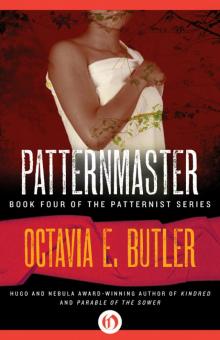 Patternmaster
Patternmaster Survivor
Survivor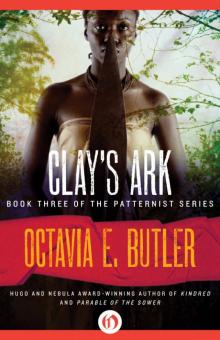 Clay's Ark
Clay's Ark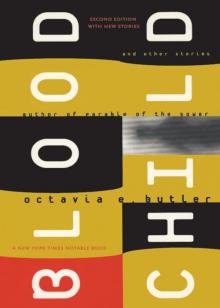 Bloodchild and Other Stories
Bloodchild and Other Stories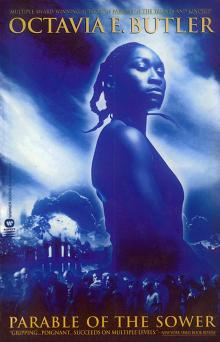 Parable of the Sower
Parable of the Sower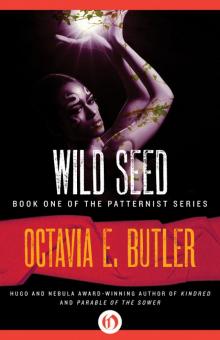 Wild Seed
Wild Seed Fledgling
Fledgling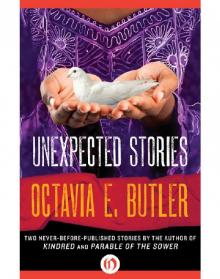 Unexpected Stories
Unexpected Stories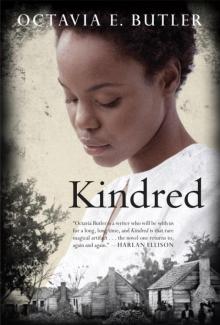 Kindred
Kindred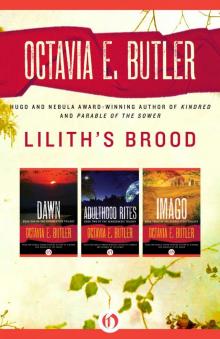 Lilith's Brood: Dawn / Adulthood Rites / Imago
Lilith's Brood: Dawn / Adulthood Rites / Imago Adulthood Rites
Adulthood Rites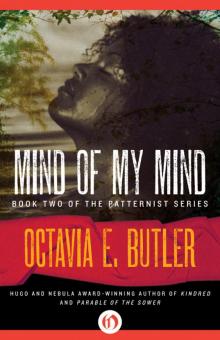 Mind of My Mind
Mind of My Mind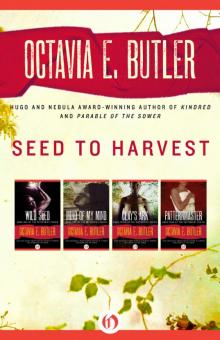 Seed to Harvest
Seed to Harvest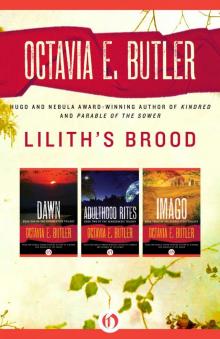 Lilith's Brood: Dawn, Adulthood Rites, and Imago (Xenogenesis Trilogy)
Lilith's Brood: Dawn, Adulthood Rites, and Imago (Xenogenesis Trilogy)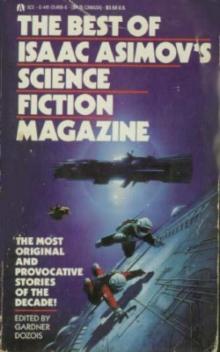 Bloodchild
Bloodchild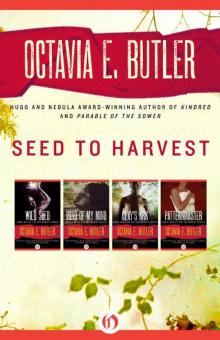 Seed to Harvest: Wild Seed, Mind of My Mind, Clay's Ark, and Patternmaster (Patternist)
Seed to Harvest: Wild Seed, Mind of My Mind, Clay's Ark, and Patternmaster (Patternist)